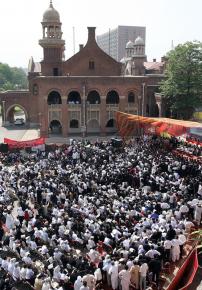Will Pakistan’s ruling coalition fall apart?
reports that Pakistan's new ruling coalition remains divided over the task that brought it together: restoring the judges President Pervez Musharraf fired.
PAKISTAN'S "NATIONAL consensus" coalition is on the verge of falling apart, as rifts develop between the country's two main political parties, the Pakistan Peoples Party (PPP) and the Pakistan Muslim League-Nawaz (PML-N).
The central issue in the crisis is the question of restoring the 60 judges who were fired by President Pervez Musharraf last November. The two parties had agreed to reinstate the judges by April 30, but the deadline passed with no action, prompting the PML-N to threaten to leave the coalition.
After an emergency meeting in Dubai between the leaders of the two parties, Nawaz Sharif (PML-N) and Asif Ali Zardari (PPP), both parties left the meeting with different ideas about the agreement they claimed to have reached. Sharif, who campaigned for re-election on the question of restoring the judiciary, says that a deadline of May 12 was established to restore the fired judges, while Zardari maintains that the timeline is flexible.
A Parliamentary Committee for the Reinstatement of Deposed Judges was established to resolve the issues that still divide the two parties: whether Musharraf can remain president, whether the constitution needs to be amended and whether judges loyal to Musharraf will remain. But a key member of this committee, Fakhruddin Ibrahim, resigned May 5 in disgust with the political maneuvering happening behind the scenes.

At the center of the controversy is the former chief justice of the Pakistani Supreme Court, Iftikhar Chaudhry.
Chaudhry emerged as an important figure in the pro-democracy movement in Pakistan after making a series of rulings that set him apart from a justice system popularly ridiculed as corrupt and ineffective. He ruled against sweetheart privatization schemes of government agencies, led formal inquiries into the fate of people who had been "disappeared" by the military or the police, and spoke out against corruption on the bench.
Thus, when Musharraf fired Chaudhry in March 2007, he sparked a countrywide lawyers' revolt that soon mushroomed into a broad protest movement by pro-democracy forces.
Chaudhry was reinstated in July after the Supreme Court threw out the charges against him. But after Musharraf won the October "elections" amid much speculation of tampering and vote-rigging, he declared martial law. Thousands of pro-democracy activists were rounded up and jailed. Musharraf dismissed Chaudhry and replaced independent judges with other judges loyal to him.
As a result, Chaudhry has become a symbol for a civil rights movement in Pakistan--and also a pole of attraction for sections of the Pakistani ruling class who want to change how law-and-order issues are handled.
BOTH THE PPP and the PML-N have claimed that they are working to help restore democracy and confidence in the judiciary in order to secure the blessings of a disgruntled electorate. But both parties are nervous about the possible consequences of a truly independent judiciary. Independent judges would likely find Musharraf's presidency to be illegal, which would create a political crisis.
An independent judiciary could also reopen corruption charges against the PPP's Zardari, who is accused of enriching himself at government expense while his wife, Benazir Bhutto, was prime minister. After Bhutto was assassinated at the end of last year, Zardari became the effective leader of the PPP.
If the judges were to target either Musharraf or Zardari, it could wreck the fragile coalition that currently runs Pakistan. In any case, tensions are already building.
The PML-N says it wants to go after Musharraf, who had, after all, come to power in 2000 in a military coup that ousted Nawaz Sharif. In February of this year, the PML-N campaigned in parliamentary elections on the slogan of impeaching Musharraf to win substantial gains at the polls.
The PPP, on the other hand, is relying on its relationship with the U.S. and its collaboration with Musharraf in order to remain in power. U.S. Deputy Secretary of State John Negroponte gave his blessing to this collaboration by telling the Pakistani media in early May that the U.S. took no position on the restoration of the judiciary, and that it was an internal Pakistani matter. Furthermore, if Zardari is brought up on corruption charges, the ruling coalition would fall apart, and the PML-N could be blamed for pressing a personal vendetta over national interests.
Looming in the background is the deteriorating economy. The stock market has lost 7 percent of its value in the last month, and inflation just reached a 13-year high. The World Bank has added Pakistan to its list of countries that could face political instability because of rising food prices.
The legal wrangling will likely continue. The PPP will attempt to force Sharif's hand, as it is already in open negotiations with other parties, such as the Muttahida Qaumi Movement (MQM) and Musharraf's faction of the PML, the PML-Quaid-i-Azam, in the hopes of bringing them into a ruling coalition without Sharif's party.
At the end of the day, neither party has a real strategy for fundamental political and economic change. But the events of 2007 raised widespread expectations for reform. When those expectations confront the economic debacle Pakistan faces in the coming months, the result could be explosive.


